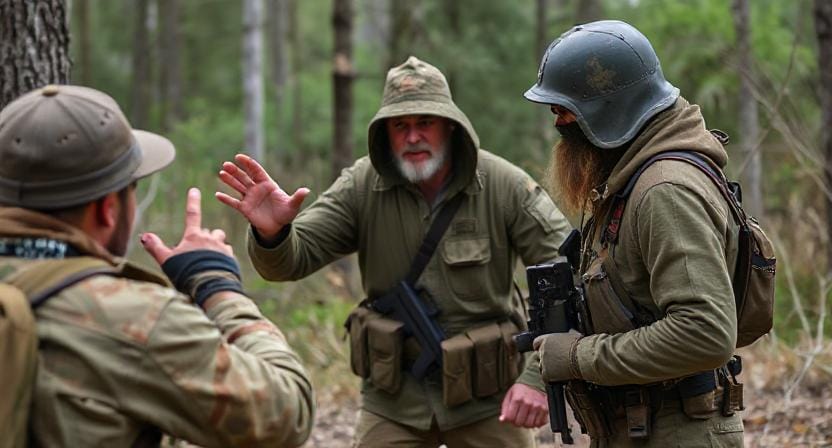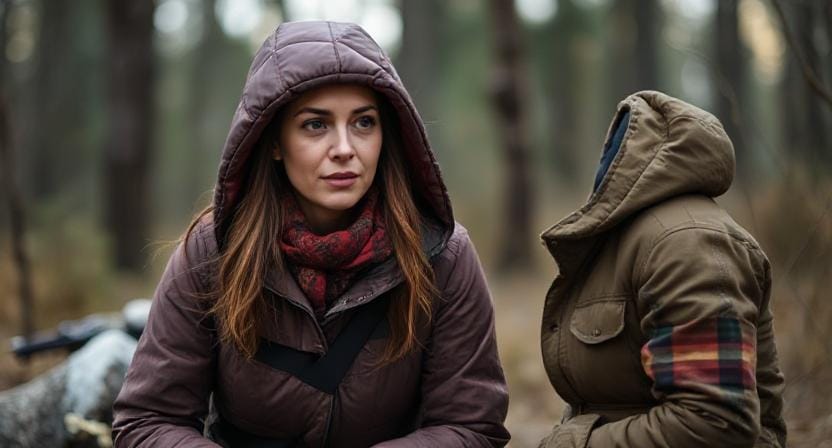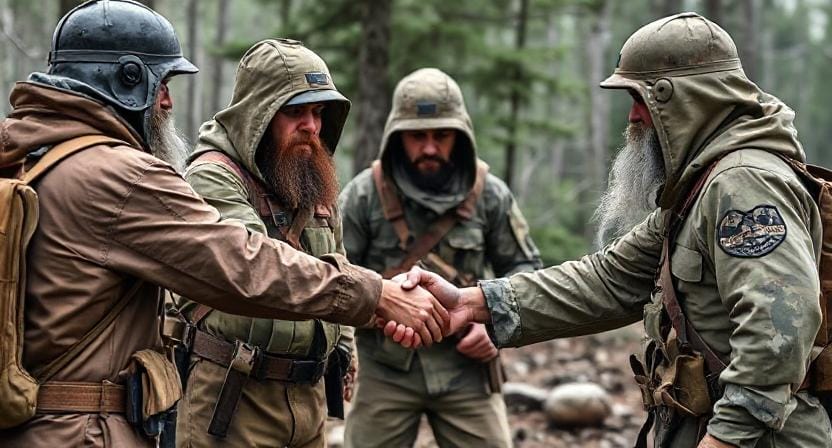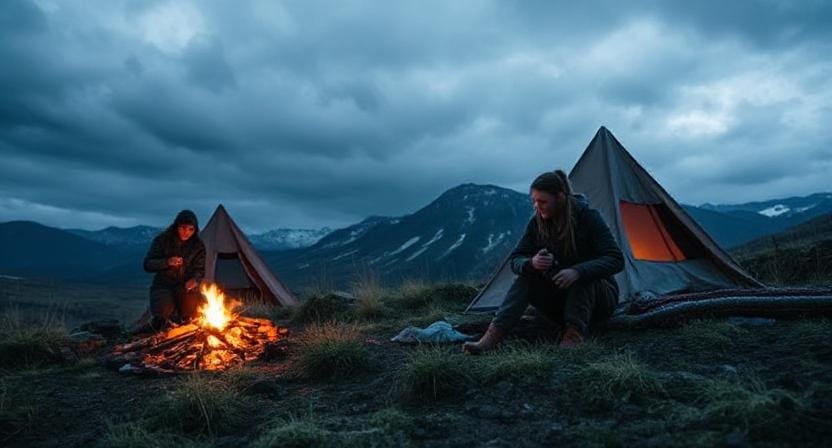Last Updated on November 1, 2025 by Kevin Collier

Top Takeaways and Key Concepts
- Stay aware and create distance; keep hands visible, calm posture.
- Use verbal de‑escalation: speak low, set boundaries, offer compliant options.
- Identify escape routes and move toward exits when safe.
- Improvise barriers or tools from surroundings to block or distract.
- Train regularly in situational awareness and non‑contact self‑defense techniques.
Picture this: you're camping in the woods, the trees are moving, and the air smells like freedom. Everything is just right. Then, all of a sudden, you see an angry bear. Or maybe it's simply your neighbor, who is staring at you because the smoke from your bonfire is blowing his way. What a surprise, huh?
It's easy to freak out in those situations. Some people think that getting a weapon is the answer. But wait a second! What if you could deal with this with just your mind and maybe a clever joke if you're feeling brave? Sounds crazy, right? But let's look into it.
Please Note: This post may contain affiliate links. If you click one of them, we may receive a commission at no extra cost to you. As an Amazon Associate, I earn from qualifying purchases.
Bears are cool, but they can also be dangerous. Don't run if you see one. That will just make matters worse. Stay strong. Speak quietly. Honestly, just pretend you're in a nature show or something. You could even add a soft wave. It may sound stupid, but believe me, it works.
What if it's your neighbor now? He might just be having a bad day. How about telling a joke instead of arguing? Something like, “I'll give you some s'mores if you give me some good vibes!” A little humor may make a big difference, don't you think?
Staying calm is very important. Take a deep breath, smile, and pay attention to what's going on around you. Be polite. Nature and your neighbors both have feelings.
So, when things get tough, remember that fast thinking and a little humor can help. Who would have thought camping could be this fun? You can do it! Have fun with the adventure, one laugh at a time. 🏕️✨
The Power of Observation: Know Your Surroundings

Let's start by talking about observation. Being aware of your environment is like having superpowers, by the way!
*** Shop for Survival Gear - Tools - Kits ***
Survival Gear - Bags and Backpacks - Knives - Boots/Footwear - Communication
Outdoor Cooking - Gloves - Hydration - Dry Boxes - Water Filtration Systems
Tents - Sleeping Bags - First Aid Kits - Multi-Tools - Flashlights - Fire Starters
Navigation - Survival Food - Night Vision - Headlamps - Stun Guns - Binoculars
When you're outside or even in your own neighborhood, pay attention to everything around you. Is there a big rock nearby that you could use to get away? Or a charming squirrel that can keep an invader from getting in?
It's interesting that a lot of fights get worse just because one side feels intimidated or trapped. It provides you choices if you can calmly look at the circumstance and find exits or safe places, like that tree over there. And let's be honest: everyone feels bolder when they know they can get away!
Body Language: Talk Without Talking

Let's talk about how body language can help you stay alive. Did you know that your body language may say a lot? If you stand tall and confident, you won't look like prey and will look more like someone who means business (even if “business” is just heading back to roasting marshmallows).
On the other side, slouching or fidgeting could make people think you're terrified, which could get you into trouble. So, be your own superhero!
Breathe deeply, stand up straight, and look the other person in the eye (but not too much; staring contests can be embarrassing). Keep in mind that confidence is contagious. It can make someone who wants to hurt you think you're not worth their effort.
Ways to Calm Down Verbally

Let's talk about words, the ultimate non-weapon weapon, since we're on the subject of confidence. It's amazing how well talking can ease tension during hostile situations. Speak clearly and in a calm voice to get your point across.
Instead of shrieking “Get away from me!” try saying something like “I really don't want any trouble.” It sounds fair, and it also makes them think twice about making things worse.
Also, humor may work wonders here! A well-placed joke about bears liking honey better than human goodies might make things better (although I wouldn't try it out). Just remember to keep it light; no one likes to hear knock-knock jokes when they're looking at someone who's upset!
Finding a Middle Ground

To be honest, finding common ground can turn enemies into friends or at least people who don't care. When you have to deal with someone who seems angry, ask questions that demonstrate you care about their point of view, like “What brings you out here today?” People get softer faster than you think when they feel heard.
When you share your experiences, you often make unforeseen connections. They might have experienced camping disasters like yours or love hiking trails just as much as you do!
If you can get along with them, they might change their mind about how to handle the situation. Before you know it, you're talking about your favorite fishing sites instead of arguing over where the campsite ends.
The Art of Retreat

Imagine this: it's midnight and you're settling down in your sleeping bag. You hear a noise outside all of a sudden. A raccoon is going through the trash like it's a buffet. We've all been through this, right?
People can act just as crazy at times. They might be a little more aggressive than normal, like that raccoon. Don't worry if things start to become hot, and not in a good way. Sometimes the best thing to do is to step back.
Think about how you're talking it out to calm things down. If that doesn't work, you can say, “You know what? I'm going to leave now. You haven't lost just because you walked away. It signifies you're safe.
You don't have to fight every battle. It's perfectly good to take a break and go back. Being in a hot spot, like a campfire that went awry, doesn't feel nice. So, look for a place that seems safe. You might want to get that hot cocoa you were thinking about.
Being away from danger is winning. You get to live to fight another day. It's hard to let go, but you did the right thing! Grab your favorite blanket, sip that cocoa, and relax. To stay alive, you have to take it easy sometimes. You can do this!
Practicing Situational Awareness Regularly

Okay, imagine this. You're hiking alone, admiring the woods and birds and feeling relaxed. You suddenly remember that you should be attentive of what's going on around you. It's like the day you almost hit a tree because you were too preoccupied thinking about lunch. Who hasn't been there?
Being alert may be quite helpful when you practice it. It doesn't have to be dull, either. When you go to the store, it can feel like a video game to avoid shopping carts. You never know when a crazy grandma could speed by. Really. They can be really fast!
What do you think about having fun with friends? You can act like one of you is an aggressor. The other(s) can work on other strategies to be calm and smart. You don't need guns, just your wits and maybe a funny quip to make things better. It can become a game, and believe me, the laughter that follows makes those times special. Later, you'll tell these stories around the campfire.
Situational awareness doesn't have to feel heavy, after all. You can have fun with it, like having a dance party in the kitchen as you make breakfast. So be aware, enjoy the little things, and remember that you have the tools to stay safe. You can do this!
Frequently Asked Questions
Why is creating distance important in a hostile encounter?
Maintaining distance increases reaction time, lowers perceived threat, and gives you more opportunity to exit without physical conflict.
How can verbal de-escalation help?
Speaking calmly and respectfully lowers emotional tension, shows non-aggression, and may redirect aggressors toward a non-violent outcome.
Should I always try to escape first?
Yes. Escape routes should be priority because removing yourself from the conflict zone is safer than trying to win an interaction.
Can improvised objects help defensively without being a “weapon”?
Items like backpacks, chairs, or doors can block, distract, or create space without intent to injure.
Why keep hands visible during confrontation?
Visible hands signal non-hostility and prevent the aggressor from assuming you’re reaching for a weapon, lowering escalation risk.
Is humor ever appropriate in tense situations?
Light humor can break tension in low-intensity encounters, but it must be used carefully and never mockingly to avoid escalation.
Why is training in situational awareness valuable?
Regular practice builds automatic scanning, risk recognition, and calm decision-making, so responses are faster when danger emerges.
Suggested Resources:
Survival Tips for Camping
https://www.survivaltips.com/camping-tips
How To Handle Hostile Encounters
https://www.safetyfirst.com/hostile-encounters
Conflict Resolution Strategies
https://www.peacefulsolutions.org/conflict-resolution-strategies
The Importance of Communication in Conflict
https://www.communicationskills.com/conflict-communication

Kevin Collier is a seasoned survivalist and expert in prepping and homesteading, contributing to WiseSurvive.com. With a deep-rooted passion for self-sufficiency and outdoor survival skills, Kevin shares practical advice, strategies, and resources to help individuals prepare for any challenge. His informative articles cover a range of topics, from essential survival techniques to sustainable living practices, empowering readers to thrive in any situation. Whether you're a novice or a seasoned prepper, Kevin's insights will inspire you to take charge of your readiness and build resilience for the future.




